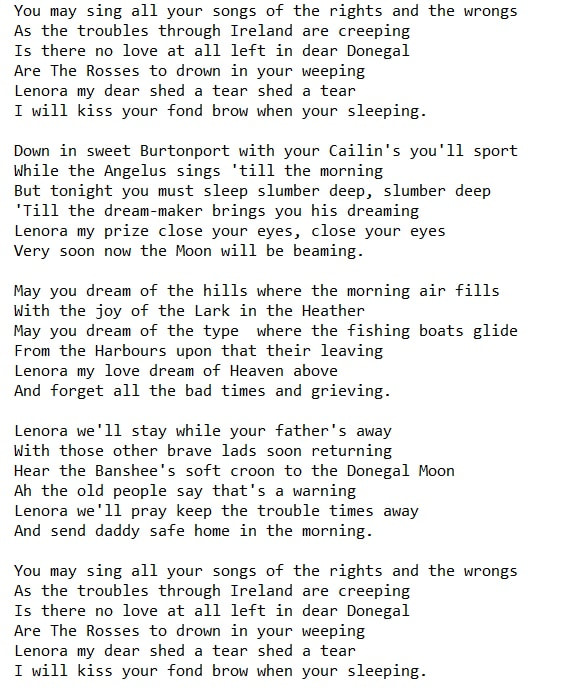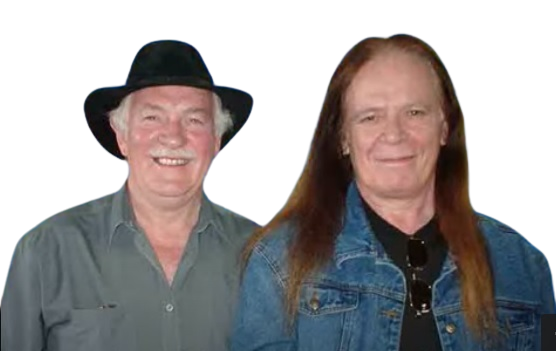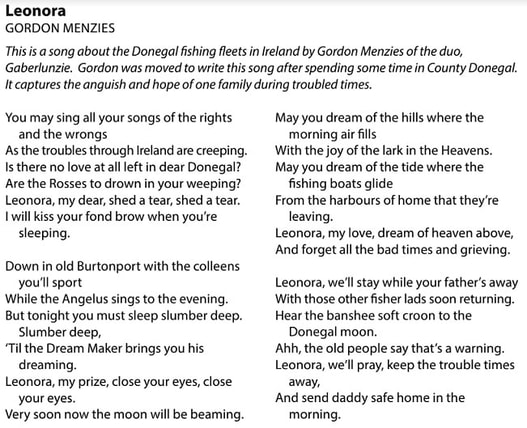Lenora Lyrics And Chords By Gaberlunzie
Leonora Guitar Chords And Lyrics By Gaberlunzie. To play along with Gaberlunzie use the chords I have given in the key of C.Also recorded by the Scottish/Irish duo, Men of Worth back in 2015. More Scottish songs here. They attribute the song to Gordon Menzies of Gaberlunzie. Note = Cailin is Irish for girl.
[C]You may sing all your songs of the [F]rights and the [C]wrongs
As the [G]troubles through Ireland are creep[C]ing
Is there [G]no love at all left in [F]dear Done[C]gal
Are The [F]Rosses to [C]drown in your [Am]weep[G]ing
Le[C]nora my [F]dear shed a [C]tear shed a [F]tear
I will [G]kiss your fond brow when your sleep[C]ing.
[C]Down in sweet Burtonport with your [F]Cailin's you'll [C]sport
While the [G]Angelus sings 'till the morn[C]ing
But to[G]night you must sleep slumber [F]deep, slumber [C]deep
'Till the [F]dream-maker [C]brings you his [Am]dream[G]ing
Le[C]nora my [F]prize close your [C]eyes, close your [F]eyes
[Am]Very [G]soon now the Moon will be beam[C]ing.
[C]May you dream of the hills where the [F]morning air [C]fills
With the [G]joy of the Lark in the Heath[C]er
May you [G]dream of the type where the [F]fishing boats [C]glide
From the [F]Harbours up[C]on that their [Am]leav[G]ing
Len[C]ora my [F]love dream of[C] Heaven a[F]bove
And for[G]get all the bad times and griev[C]ing.
Lenora we'll stay while your father's away
With those other brave lads soon returning
Hear the Banshee's soft croon to the Donegal Moon
Ah the old people say that's a warning
Lenora we'll pray keep the trouble times away
And send daddy safe home in the morning.
You may sing all your songs of the rights and the wrongs
As the troubles through Ireland are creeping
Is there no love at all left in dear Donegal
Are The Rosses to drown in your weeping
Lenora my dear shed a tear shed a tear
I will kiss your fond brow when your sleeping.
As the [G]troubles through Ireland are creep[C]ing
Is there [G]no love at all left in [F]dear Done[C]gal
Are The [F]Rosses to [C]drown in your [Am]weep[G]ing
Le[C]nora my [F]dear shed a [C]tear shed a [F]tear
I will [G]kiss your fond brow when your sleep[C]ing.
[C]Down in sweet Burtonport with your [F]Cailin's you'll [C]sport
While the [G]Angelus sings 'till the morn[C]ing
But to[G]night you must sleep slumber [F]deep, slumber [C]deep
'Till the [F]dream-maker [C]brings you his [Am]dream[G]ing
Le[C]nora my [F]prize close your [C]eyes, close your [F]eyes
[Am]Very [G]soon now the Moon will be beam[C]ing.
[C]May you dream of the hills where the [F]morning air [C]fills
With the [G]joy of the Lark in the Heath[C]er
May you [G]dream of the type where the [F]fishing boats [C]glide
From the [F]Harbours up[C]on that their [Am]leav[G]ing
Len[C]ora my [F]love dream of[C] Heaven a[F]bove
And for[G]get all the bad times and griev[C]ing.
Lenora we'll stay while your father's away
With those other brave lads soon returning
Hear the Banshee's soft croon to the Donegal Moon
Ah the old people say that's a warning
Lenora we'll pray keep the trouble times away
And send daddy safe home in the morning.
You may sing all your songs of the rights and the wrongs
As the troubles through Ireland are creeping
Is there no love at all left in dear Donegal
Are The Rosses to drown in your weeping
Lenora my dear shed a tear shed a tear
I will kiss your fond brow when your sleeping.
Here are the guitar chords in the key of G Major in case the key of C doesn't suit your voice. If these don't work then try a capo.
[G]You may sing all your songs of the [C]rights and the [G]wrongs
As the [D]troubles through Ireland are creep[G]ing
Is there [D]no love at all left in [C]dear Done[G]gal
Are The [C]Rosses to [G]drown in your [Em]weep[D]ing
Le[G]nora my [C]dear shed a [G]tear shed a [C]tear
I will [D]kiss your fond brow when your sleep[G]ing.
[G]Down in sweet Burtonport with your [C]Cailin's you'll [G]sport
While the [D]Angelus sings 'till the morn[G]ing
But to[D]night you must sleep slumber [C]deep, slumber [G]deep
'Till the [C]dream-maker [G]brings you his [Em]dream[D]ing
Le[G]nora my [C]prize close your [G]eyes, close your [C]eyes
[Em]Very [D]soon now the Moon will be beam[G]ing.
[G]May you dream of the hills where the [C]morning air [G]fills
With the [D]joy of the Lark in the Heath[G]er
May you [D]dream of the type where the [C]fishing boats [G],,,,,?
From the [C]Harbours up[G]on that their [Em]leav[D]ing
Len[G]ora my [C]love dream of[G] Heaven a[C]bove
And for[D]get all the bad times and griev[G]ing.
Here's a comment that was sent to me by Ivan.
Did Gaberlunzie write the song ?
I am inclined to think not, and i think the line in the verse about Burtonport should go "While the Angelus rings in the evening"
Simply because the whole verse is about the evening; going to sleep, the dream-maker, and the moon. "evening" is a better rhyme for "dreaming" and "beaming". And finally because a young girl is more likely to be out playing with her pals at 6pm than at 6am.
Below are the lyrics to Leonora from their Album ''Celtic Journeys'' and a couple of the words differ from the version above.
The Gaberlunzie band is a Scottish folk music group that has been captivating audiences for over five decades. The band, consisting of Robin Watson and Gordon Menzies, has become a household name in the Scottish music scene, both in their home country and internationally. Through their unique blend of traditional and contemporary folk music, the Gaberlunzie band has not only entertained but also educated listeners on the rich cultural heritage of Scotland.
The origins of the Gaberlunzie band can be traced back to the early 1960s when Robin Watson and the late Gordon Menzies met at a music session in Edinburgh. Both men shared a passion for Scottish folk music and quickly bonded over their love for the genre. They began playing together and eventually formed the Gaberlunzie band in 1969. The band's name was inspired by the old Scottish ballad, 'The Gaberlunzie Man,' which tells the story of a wandering beggar who charms his way into the homes of the wealthy.
From the beginning, the Gaberlunzie band set out to preserve and promote traditional Scottish music. They were heavily influenced by the works of renowned folk musicians such as Hamish Henderson, Ewan MacColl, and The Corries. As such, their music reflects the traditional styles of Scottish folk, with a strong emphasis on storytelling and acoustic instrumentation. However, the band also incorporates contemporary elements into their music, creating a unique and modern sound.
One of the Gaberlunzie band's most significant contributions to Scottish folk music is their use of the Scots language. Scots, also known as Lowland Scots, is a Germanic language spoken in Scotland and has its roots in Old English. Through their music, the band has helped to preserve this ancient language and introduce it to a wider audience. This has been particularly significant in recent years as there has been a renewed interest in preserving and promoting Scotland's linguistic heritage.
The Gaberlunzie band's discography spans over 30 albums, with their first album, 'Gaberlunzie,' released in 1970. Their music covers a wide range of topics, from traditional Scottish ballads to original compositions. Some of their most well-known songs include 'Auld Lang Syne,' 'Farewell to Scotland,' and 'The Gypsy Laddies.' Their music has been described as both haunting and uplifting, with powerful vocals and intricate instrumentals.
Throughout their career, the Gaberlunzie band has toured extensively, both in Scotland and abroad. They have performed at prestigious venues such as the Edinburgh Festival Fringe and the Celtic Connections festival, as well as in countries including Canada, Australia, and New Zealand. Their live performances are known for their energy and audience engagement, often involving sing-alongs and storytelling.
Aside from their musical talents, the Gaberlunzie band members are also known for their dedication to preserving Scottish culture. They have been involved in various cultural events and initiatives, such as the Scottish Traditional Boat Festival and the Traditional Music and Song Association of Scotland. They have also been strong advocates for the preservation of Scotland's natural landscapes, often incorporating environmental themes into their music.
In addition to their music, the Gaberlunzie band has also dabbled in other forms of media. They have published two books, 'Gaberlunzie: The First 25 Years' and 'Gaberlunzie: The Second 25 Years,' which chronicle their journey as a band. They have also released a DVD, 'Gaberlunzie Live at the Queen's Hall,' which captures one of their iconic live performances.
In conclusion, the Gaberlunzie band has made a significant impact on the Scottish folk music scene, both through their music and their cultural contributions. Their dedication to preserving traditional Scottish music, language, and culture has earned them a loyal fan base and critical acclaim. As they continue to perform and create music, the Gaberlunzie band remains a treasured part of Scotland's cultural heritage.
The origins of the Gaberlunzie band can be traced back to the early 1960s when Robin Watson and the late Gordon Menzies met at a music session in Edinburgh. Both men shared a passion for Scottish folk music and quickly bonded over their love for the genre. They began playing together and eventually formed the Gaberlunzie band in 1969. The band's name was inspired by the old Scottish ballad, 'The Gaberlunzie Man,' which tells the story of a wandering beggar who charms his way into the homes of the wealthy.
From the beginning, the Gaberlunzie band set out to preserve and promote traditional Scottish music. They were heavily influenced by the works of renowned folk musicians such as Hamish Henderson, Ewan MacColl, and The Corries. As such, their music reflects the traditional styles of Scottish folk, with a strong emphasis on storytelling and acoustic instrumentation. However, the band also incorporates contemporary elements into their music, creating a unique and modern sound.
One of the Gaberlunzie band's most significant contributions to Scottish folk music is their use of the Scots language. Scots, also known as Lowland Scots, is a Germanic language spoken in Scotland and has its roots in Old English. Through their music, the band has helped to preserve this ancient language and introduce it to a wider audience. This has been particularly significant in recent years as there has been a renewed interest in preserving and promoting Scotland's linguistic heritage.
The Gaberlunzie band's discography spans over 30 albums, with their first album, 'Gaberlunzie,' released in 1970. Their music covers a wide range of topics, from traditional Scottish ballads to original compositions. Some of their most well-known songs include 'Auld Lang Syne,' 'Farewell to Scotland,' and 'The Gypsy Laddies.' Their music has been described as both haunting and uplifting, with powerful vocals and intricate instrumentals.
Throughout their career, the Gaberlunzie band has toured extensively, both in Scotland and abroad. They have performed at prestigious venues such as the Edinburgh Festival Fringe and the Celtic Connections festival, as well as in countries including Canada, Australia, and New Zealand. Their live performances are known for their energy and audience engagement, often involving sing-alongs and storytelling.
Aside from their musical talents, the Gaberlunzie band members are also known for their dedication to preserving Scottish culture. They have been involved in various cultural events and initiatives, such as the Scottish Traditional Boat Festival and the Traditional Music and Song Association of Scotland. They have also been strong advocates for the preservation of Scotland's natural landscapes, often incorporating environmental themes into their music.
In addition to their music, the Gaberlunzie band has also dabbled in other forms of media. They have published two books, 'Gaberlunzie: The First 25 Years' and 'Gaberlunzie: The Second 25 Years,' which chronicle their journey as a band. They have also released a DVD, 'Gaberlunzie Live at the Queen's Hall,' which captures one of their iconic live performances.
In conclusion, the Gaberlunzie band has made a significant impact on the Scottish folk music scene, both through their music and their cultural contributions. Their dedication to preserving traditional Scottish music, language, and culture has earned them a loyal fan base and critical acclaim. As they continue to perform and create music, the Gaberlunzie band remains a treasured part of Scotland's cultural heritage.



